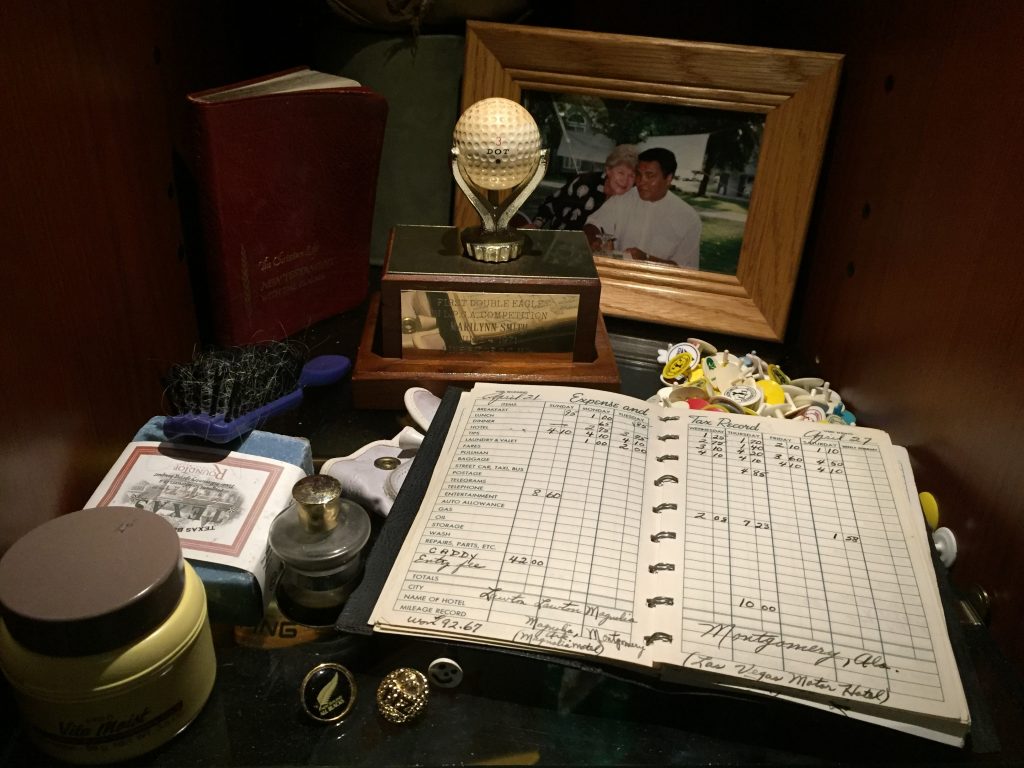By Travis Puterbaugh, Curator
Featured on WomensGolf.com
In 2017, Brooks Koepka captured the United States Open Golf Championship, and along with it, a winner’s share of $2.16 million dollars. Sung Hyun Park, the winner of the U.S. Women’s Open, captured $900,000 for her victory, or roughly 41% less than Koepka.
Going back to the 1940s, the disparity in prize money for men and women was far greater. The All American Open, also known as the Tam O’Shanter, was an event played concurrently with draws for both men and women. At the 1944 event, Byron Nelson pocketed $14,000 as the winner, while Betty Hicks earned $500, a remarkable gap of 2,800%.
Tell this to Marilynn Smith – one of the 13 founding members of the LPGA – and she says with a laugh, “Oh, we didn’t play for the money back then. We played to make the tour a success.”
The seeds of the modern women’s tour were born from this inequality in standing and pay. The Women’s Professional Golf Association (WPGA) came first in 1944, but struggled to take hold and proved short-lived. On September 30, 1950, the Ladies Professional Golf Association (LPGA) was officially incorporated during the Women’s U.S. Open at the Rolling Hills Country Club in Wichita, Kansas.
Smith, a three-time Kansas Women’s Amateur champion, soon joined the original five founders – Patty Berg, Helen Dettweiler, Sally Sessions, Betty Jameson, and Helen Hicks – to become one of the 13 founders of the LPGA.
During the first year of the LPGA, there were 14 events totaling $50,000 in prize money. By the end of the decade, there were 26 events and $200,000 in total prize money. Along the way, however, Smith was one of the many women who traversed the country to promote and grow the LPGA. She became known as “Miss Personality” for her outgoing nature, serving as LPGA Secretary (1957) and President (1958-60), making appearances on radio and TV, as well as at civic luncheons, press conferences, and even boxing matches and baseball games to help sell their tour to a wide audience.
In her time as LPGA president, Smith spearheaded the formation of the LPGA Teaching Division, helped establish the Pro-Am format as a feature of every LPGA event, and formed the LPGA National Golf School. Smith would later go on to win 21 titles on the LPGA Tour herself, including two Major championships, the 1963 and 1964 Titleholders Championship.
Her “Expense & Tax Record” log book for 1957 – donated to the World Golf Hall of Fame & Museum in 2006 – is a fascinating window into the life of a professional golfer on a burgeoning tour. In it, Smith kept meticulous records of all expenses incurred during her travels, making it easy to follow her winding path through America – and even Cuba – during that season.
Sponsored by Spalding and given $5,000 annually to cover her expenses, every item from meals, hotel lodging, telephone calls, clothing purchases, tournament entry and caddie fees, laundry and even tips can be accounted for in this record book. It’s interesting that she noted the names of hotels and motels where she stayed in each town. Many of these establishments are long-closed, but a few such as the Sands Motel in Las Cruces, New Mexico, the Cloister in Sea Island, Georgia, and even the Hotel Copacabana in Havana, Cuba remain in business 61 years later.
Some of the more interesting highlights include:
- Caddie fees were typically her most costly expense per week. The week of the LPGA Championship cost her $72 ($637.17 in today’s dollars).
- She won $384 at the Tampa Open. In today’s dollars ($3,398.21) that is proportionally just slightly greater than what Amelia Lewis earned for finishing T-71 at the Indy Women in Tech Championship in 2017.
- During the Sea Island Open in January, Smith stayed at The Cloister at Sea Island for $10.30 per night, or $91.15 in today’s dollars. Today, lodging at The Cloister on the same dates would run approximately $371.50 per night.
- Smith spent an average of $1.70 for breakfast, and rarely spent more than $5 on dinner.
- A round-trip ticket from Miami to Cuba for the Havana Open cost $36 ($318.58 in today’s dollars).
Looking back on that era, Smith recalls with a fondness the bond that existed between the women on the tour.
“We’d drive across the country in a caravan of four or five cars, and if someone got a flat, we’d all stop to help,” she says. “We were dreamers and we were a small group, but everybody bonded together to make it go.”
Despite the strides that still need to be made with wage equality in the sport, when asked if she ever imagined a Women’s U.S. Open winner receiving a check for $900,000 Smith replies that they “never thought that far ahead. We hoped that we could make more money eventually, but we were very persistent. We were not going to let the (Tour) fold.”
While there is still work that needs to be done to address the income gap in golf between men and women, thanks to original Founders such as Smith, the LPGA has grown exponentially over the decades into the truly global tour that it is today.

